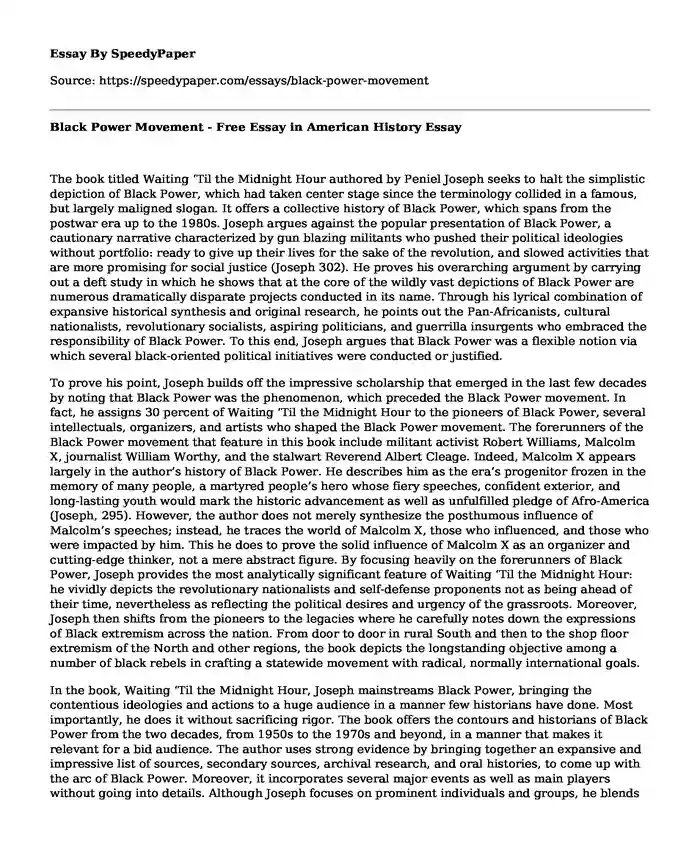
| Type of paper: | Essay |
| Categories: | Race Racism United States American history |
| Pages: | 3 |
| Wordcount: | 670 words |
The book titled Waiting ‘Til the Midnight Hour authored by Peniel Joseph seeks to halt the simplistic depiction of Black Power, which had taken center stage since the terminology collided in a famous, but largely maligned slogan. It offers a collective history of Black Power, which spans from the postwar era up to the 1980s. Joseph argues against the popular presentation of Black Power, a cautionary narrative characterized by gun blazing militants who pushed their political ideologies without portfolio: ready to give up their lives for the sake of the revolution, and slowed activities that are more promising for social justice (Joseph 302). He proves his overarching argument by carrying out a deft study in which he shows that at the core of the wildly vast depictions of Black Power are numerous dramatically disparate projects conducted in its name. Through his lyrical combination of expansive historical synthesis and original research, he points out the Pan-Africanists, cultural nationalists, revolutionary socialists, aspiring politicians, and guerrilla insurgents who embraced the responsibility of Black Power. To this end, Joseph argues that Black Power was a flexible notion via which several black-oriented political initiatives were conducted or justified.
To prove his point, Joseph builds off the impressive scholarship that emerged in the last few decades by noting that Black Power was the phenomenon, which preceded the Black Power movement. In fact, he assigns 30 percent of Waiting ‘Til the Midnight Hour to the pioneers of Black Power, several intellectuals, organizers, and artists who shaped the Black Power movement. The forerunners of the Black Power movement that feature in this book include militant activist Robert Williams, Malcolm X, journalist William Worthy, and the stalwart Reverend Albert Cleage. Indeed, Malcolm X appears largely in the author’s history of Black Power. He describes him as the era’s progenitor frozen in the memory of many people, a martyred people’s hero whose fiery speeches, confident exterior, and long-lasting youth would mark the historic advancement as well as unfulfilled pledge of Afro-America (Joseph, 295). However, the author does not merely synthesize the posthumous influence of Malcolm’s speeches; instead, he traces the world of Malcolm X, those who influenced, and those who were impacted by him. This he does to prove the solid influence of Malcolm X as an organizer and cutting-edge thinker, not a mere abstract figure. By focusing heavily on the forerunners of Black Power, Joseph provides the most analytically significant feature of Waiting ‘Til the Midnight Hour: he vividly depicts the revolutionary nationalists and self-defense proponents not as being ahead of their time, nevertheless as reflecting the political desires and urgency of the grassroots. Moreover, Joseph then shifts from the pioneers to the legacies where he carefully notes down the expressions of Black extremism across the nation. From door to door in rural South and then to the shop floor extremism of the North and other regions, the book depicts the longstanding objective among a number of black rebels in crafting a statewide movement with radical, normally international goals.
In the book, Waiting ‘Til the Midnight Hour, Joseph mainstreams Black Power, bringing the contentious ideologies and actions to a huge audience in a manner few historians have done. Most importantly, he does it without sacrificing rigor. The book offers the contours and historians of Black Power from the two decades, from 1950s to the 1970s and beyond, in a manner that makes it relevant for a bid audience. The author uses strong evidence by bringing together an expansive and impressive list of sources, secondary sources, archival research, and oral histories, to come up with the arc of Black Power. Moreover, it incorporates several major events as well as main players without going into details. Although Joseph focuses on prominent individuals and groups, he blends useful anecdotes that reveal the wide-reaching influence of Black Power (Joseph 302).
Work Cited
Joseph, Peniel E. Waiting 'til the Midnight Hour: A Narrative History of Black Power in America. New York: Henry Holt, 2006. Print.
Cite this page
Black Power Movement - Free Essay in American History. (2017, Oct 16). Retrieved from https://speedypaper.net/essays/black-power-movement
Request Removal
If you are the original author of this essay and no longer wish to have it published on the SpeedyPaper website, please click below to request its removal:
- True Love Definition Essay Samples
- Writing in October - Analysis Essay Sample
- Essay Sample Dedicated to the Use of N-word and the Language Effect: Power and Politeness
- Essay Example on Women on Boards: Does Diversity Guarantee Better Performance?
- Addiction Counselling - Free Essay Example
- Free Paper Sample on Sexist and Racist World of Theatre
- Paper Example on Medical Assistance in Dying: Canadian Nurses Experiences
Popular categories




